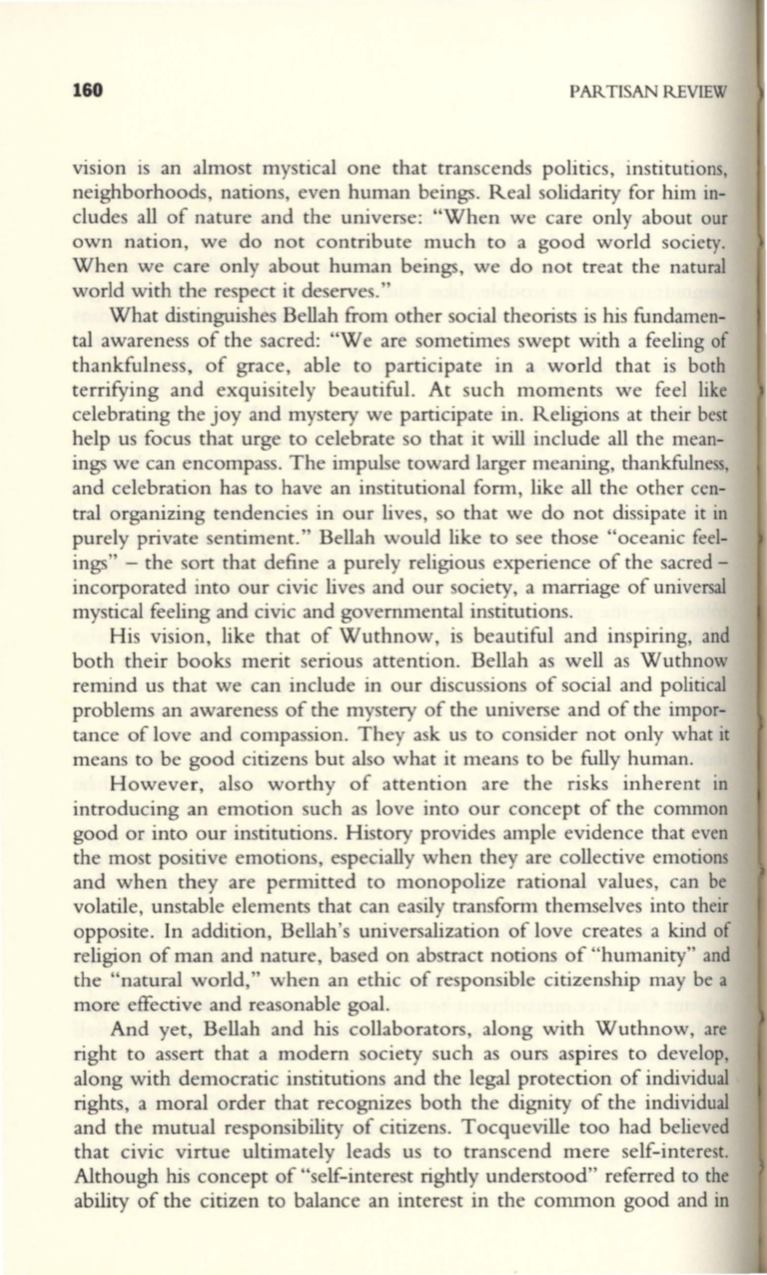
160
PARTISAN REVIEW
VISIOn is an almost mystical one that transcends politics, institutions,
neighborhoods, nations, even human beings. Real solidarity for him in–
cludes all of nature and the universe: "When we care only about our
own nation, we do not contribute much to a good world society.
When we care only about human beings, we do not treat the natural
world with the respect it deserves."
What distinguishes Bellah from other social theorists is his fundamen–
tal awareness of the sacred: "Weare sometimes swept with a feeling of
thankfulness, of grace, able
to
participate in a world that is both
terrifying and exquisitely beautiful. At such moments we feel like
celebrating the joy and mystery we participate in. Religions at their best
help us focus that urge to celebrate so that it will include all the mean–
ings we can encompass. The impulse toward larger meaning, thankfulness,
and celebration has to have an institutional form, like all the other cen–
tral organizing tendencies in our lives, so that we do not dissipate it in
purely private sentiment." Bellah would like to see those "oceanic feel–
ings" - the sort that define a purely religious experience of the sacred -
incorporated into our civic lives and our society, a marriage of universal
mystical feeling and civic and governmental institutions.
His vision, like that of Wuthnow, is beautiful and inspiring, and
both their books merit serious attention. Bellah as well as Wuthnow
remind us that we can include in our discussions of social and political
problems an awareness of the mystery of the universe and of the impor–
tance of love and compassion. They ask us to consider not only what it
means to be good citizens but also what it means to be fully human.
However, also worthy of attention are the risks inherent in
introducing an emotion such as love into our concept of the common
good or into our institutions. History provides ample evidence that even
the most positive emotions, especially when they are collective emotions
and when they are permitted to monopolize rational values, can be
volatile, unstable elements that can easily transform themselves into their
opposite. In addition, Bellah's universalization of love creates a kind of
religion of man and nature, based on abstract notions of "humanity" and
the "natural world," when an ethic of responsible citizenship may be a
more effective and reasonable goal.
And yet, Bellah and his collaborators, along with Wuthnow, are
right to assert that a modern society such as ours aspires to develop,
along with democratic institutions and the legal protection of individual
rights, a moral order that recognizes both the dignity of the individual
and the mutual responsibility of citizens. Tocqueville too had believed
that civic virtue ultimately leads us to transcend mere self-interest.
Although his concept of "self-interest rightly understood" referred to the
ability of the citizen to balance an interest in the common good and in


